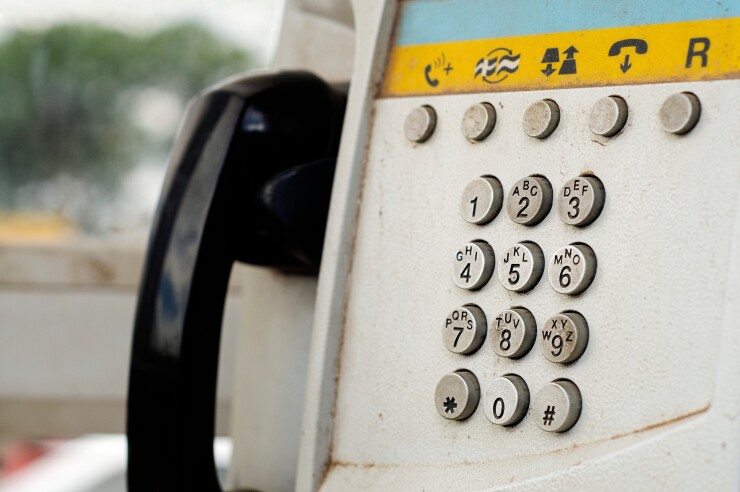Editor's Note: This post is part of a recurring series of classics from our archives. The story below — from Aug. 9, 1994 — discussed a bank's plan to offer prepaid telephone calling cards, with 10 free minutes and the option to add time with a credit card or branch visit. More than 20 years later, telecommunications and prepaid offerings have come a long way.
Ga. bank offering prepaid telephone card
By Valerie Block
Banks may not be noted for tackling new business trends, but Community Bank and Trust of Cornelia, Ga., could score big points for innovation with its prepaid telephone calling cards.
J. Alton Wingate, chairman and chief executive officer of the $140 million-asset bank, has announced a joint venture with Teletron Inc., a company that markets the trendy new form of telephone card.
"This is the beginning of our superhighway," the banker said.

Known in the industry as a supermarket banking pioneer more than 10 years ago, Mr. Wingate said that by mid-August, Community Bank will mail its 10,000 customers a complimentary calling card enabling them to call anywhere in America for up to 10 minutes, free.
Spotted Them in Europe
Mr. Wingate first encountered prepaid cards in 1991 in Europe, and as their popularity begins to spread in this country, he wants to use them as an advertising and marketing medium.
"We look for products we can offer our customers to continue to build relationships and have our name out in front of them," he said.
Although Mr. Wingate points out that the card will create goodwill among the 30,000 residents of Habersham County, it will also generate income for Community Trust.
To Earn 5% to 10%
After the initial 10 minutes are used up, customers can add time to their cards by using a credit card or going to a bank branch. Community Bank will earn 5% to 10% of sales, depending on volume. "It's got potential to generate $50,000 to $75,000 per year in noninterest income," Mr. Wingate said.
He is expecting 40% penetration in the community, and plans to offer the service to other Georgia banks through Financial Supermarkets Inc., a nonbank subsidiary of Community Trust.
Initial investment will be close to $50,000 for card manufacturing, promotional materials, and calling time.
Gerald S. Lerner, vice president of Teletron Inc., said the cards, which carry the bank's logo, can be a powerful marketing tool. "There's an amazing amount of technology available," he said, "from customized voice greetings to promotional advertisements and the customers pay for it if they choose to listen."
The Florida Bankers Association has endorsed Teletron's calling card program and is marketing it to members.
"So far, there hasn't been a great response, but that's not unusual with a new program," said Patricia L. Bell, vice president of BancServe Inc., a for-profit subsidiary of the Florida Bankers Association.
"We still think it's a good product."
Customers can make calls without coins or credit cards by dialing an 800 number printed on the back of their prepaid card and then punching in a personal identification number.
At 35 cents a minute, and without the 75-cent network access charge of standard calling cards, Community Bank's prepaid card can save callers up to 41% from regular long-distance rates.
Explosive Expansion
Prepaid phone cards, unheard of in the United States two years ago, have set off a boom in telecommunications and marketing circles.
"It's a very big business that's really exploding," said Harris Shapiro, managing director of investment banking at Whale Securities in New York.
The prepaid phone card industry generated $4 billion worldwide in 1993.
While Mr. Shapiro said only $300 million of that was in the United States, he projects the market here will grow to more than a $1 billion by 1995.
Marketers of prepaid cards range from telephone companies like AT&T and Ameritech to boutique marketing agents that typically buy and resell long-distance time from the major carriers.
Mr. Shapiro said hundreds of new companies have sprouted in the field since 1992, some more reputable than others.
Paul Silverstein, president of Global Telecommunications Solutions Inc., one of the first and more established prepaid card companies, said he started two years ago selling phone cards on the streets of New York. Now his firm occupies a 4,000-square-foot office overlooking Madison Avenue.
Broad Range of Clients
Authorized to reproduce images on prepaid phone cards for Major League Baseball, the U.S. Postal Service, and Marvel Entertainment, among others, Mr. Silverstein's clients offering promotional phone cards include Meineke Discount Muffler Shops, Success Magazine, and Lufthansa Airlines.
In November 1993, GTS produced 600 phone cards for the Bank of Tokyo in New York, which were distributed to customers when the bank changed locations.
Mr. Silverstein said those cards are worth $150 each on the collectors' market, another hot segment of the prepaid card business.
Parents Like Cards
Gaining popularity with consumers, prepaid cards are useful for parents of college students who want to hear from their children while controlling costs.
They also provide a convenience for people with credit problems who don't qualify for standard calling cards.
Some corporations, getting hip to the savings potential, use prepaid cards to control expenses of employees on the road.
Teletron distributes prepaid phone cards for General Motors Acceptance Corp. and Conoco Inc., and is negotiating with several major financial institutions.





